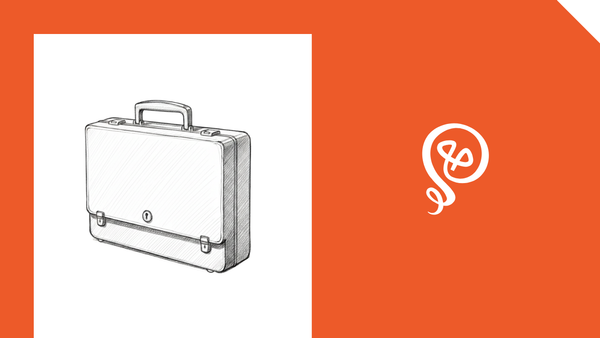How Successful Freelancers Build a Great Reputation
Stand out from the crowd.

Job postings for freelancers often receive hundreds of applicants. Most do the same thing: share a link to their portfolio and hope for the best.
Other freelancers spend a lot of time cold pitching clients — a tactic that's increasingly less effective. It's hard to stand out from the "noise" all around.
Freelancers who maintain a steady stream of clients and inquiries often rely on referrals and testimonials. They rise to the top because they've proven that they're good. For clients, it's less risky to work with someone who came highly recommended.
To build a great reputation and stand out from the crowd, you have to do a few things differently than other freelancers.
Be reliable
This might sound obvious, but a shocking number of freelancers don't deliver work on time or as promised. You can immediately rise to the top in your client's eyes by meeting deadlines. That's the first step to asking clients for testimonials (which I'll discuss later).
Many freelancers struggle with deadlines because they don't have good time management skills. They underestimate how much time a project will take. Or they're not good at structuring their day around work so they fall behind.
There are a few things you can do to avoid missing client deadlines, including:
- Review a project immediately and ask any questions you have
- Build in some buffer time, in case something unexpected comes up
- Use time blocking and add the project's milestones to your calendar
Clients consistently refer to me as "reliable" — which helps tremendously when potential clients review my profile and what it's like to work with me. Being known as a reliable freelance will immediately help you stand out.

Communicate clearly and frequently
If missing a deadline is unavoidable (it happens — we all have lives outside of work), make sure you communicate with your client as early as possible. Provide a new date by which you expect to deliver.
The last thing you want to do is let clients know at the last minute that your work will be late. Clients are depending on you to meet their own internal deadlines. Late work can have a downstream impact on their projects.
Additionally, let your clients know your expected response time for communication. Don't feel pressured to respond immediately, but make sure clients know if they can expect to hear from you the same day, within 24 hours, etc.
You'll also want to communicate your availability for ongoing work. For example, I take vacation time throughout the year. I'll let my clients know well in advance — usually a month — that I'll be unavailable. That way, they can plan their work around my absence.
Collect client testimonials
Successful freelancers proudly showcase their happy clients. Testimonials are proof that your work is amazing and help you secure future work.
A lot of good freelancers don't take the time to collect customer testimonials. That's what sets really successful freelancers apart: they know that testimonials strengthen their business.
I look for opportune times to ask my clients for testimonials. If a client compliments my work, it's a natural time to make the request. I'll say something like:
"Would you mind saying this in a testimonial I can use? Testimonials from my clients really help my business."
I also ask clients for a testimonial when they are leaving an organization. I work with a lot of big companies, so my internal contacts come and go. If I find out one is leaving, I ask for a testimonial. I don't know what the replacement contact will be like, and I want to capture a testimonial that reflects a good working relationship.
I collect client recommendations on my LinkedIn profile. That way, the testimonials are publicly displayed. I'll add the best testimonials to my website, but LinkedIn makes it easy to collect recommendations.
Keep your portfolio current
I know, I know... keeping your portfolio updated can be a chore. It's one more thing to maintain.
But here's the thing: you improve over time. Your sample work gets better. You work with better clients. Or some of your work might simply become outdated (like all of the stuff I wrote about the Covid-19 pandemic impacting technology back in 2021...)
Some of the earliest examples in my writing portfolio were ghostwritten. Over time, I've been able to replace those examples with bylined work for more prominent companies. I still sometimes send links to my older work if a client needs a very specific example, but my portfolio showcases very current, relevant examples.
I keep track of all of my published work for clients in Airtable [affiliate link]. I'll add the link to the live URL on the client's website. Then I'll add the best examples to JournoPortfolio, which hosts my portfolio. JournoPortfolio takes a PDF backup copy of all URLs added, so if the published work is taken down for some reason, I still have a copy.
I make updates to my portfolio every month or two.
Maintain a digital presence
You could have amazing testimonials and an awesome portfolio, but you won't draw in more business unless clients find you.
Sure, you might build a steady stream of referral work from your existing clients. But if you combine your portfolio and testimonials with a social presence, you'll drive business that outearns most freelancers.
With a presence on social platforms, you can showcase your personality. You do not have to be overly promotional (I know platforms like LinkedIn can be cringe). Just show up and talk about the work you do. It's a way to establish additional authority as a freelancer.
I'm really active on LinkedIn. Potential clients see me in their feeds. They check out my profile and can see the testimonials from happy clients. They check out my portfolio, which confirms the quality of my work. Then they reach out. From there, it's much easier to sign a contract because they've already confirmed (at least somewhat) that I'd be a good fit for their needs. You win without pitching.
Solid work + reputation = increased rates
Over the years, I've steadily raised my rates. The more I gather examples in my portfolio and testimonials from clients, the more I can demonstrate the quality of my work. This has allowed me to increase my pricing.
In addition to added revenue, a great reputation builds a more sustainable freelance business. You'll have a consistent stream of inbound inquiries because there's never a shortage of clients who need high-quality freelancers.
And many of these clients will never post on a job board. They'd much rather approach a freelancer they think would be a good fit than sift through 1,000 applications. As a result, your reputation brings you opportunities that aren't widely available to other freelancers.
Freelance pricing is incredibly opaque, but I’ve created a free resource for fellow writers. It outlines my rates, how I think about pricing, and how my pricing has evolved over time.






